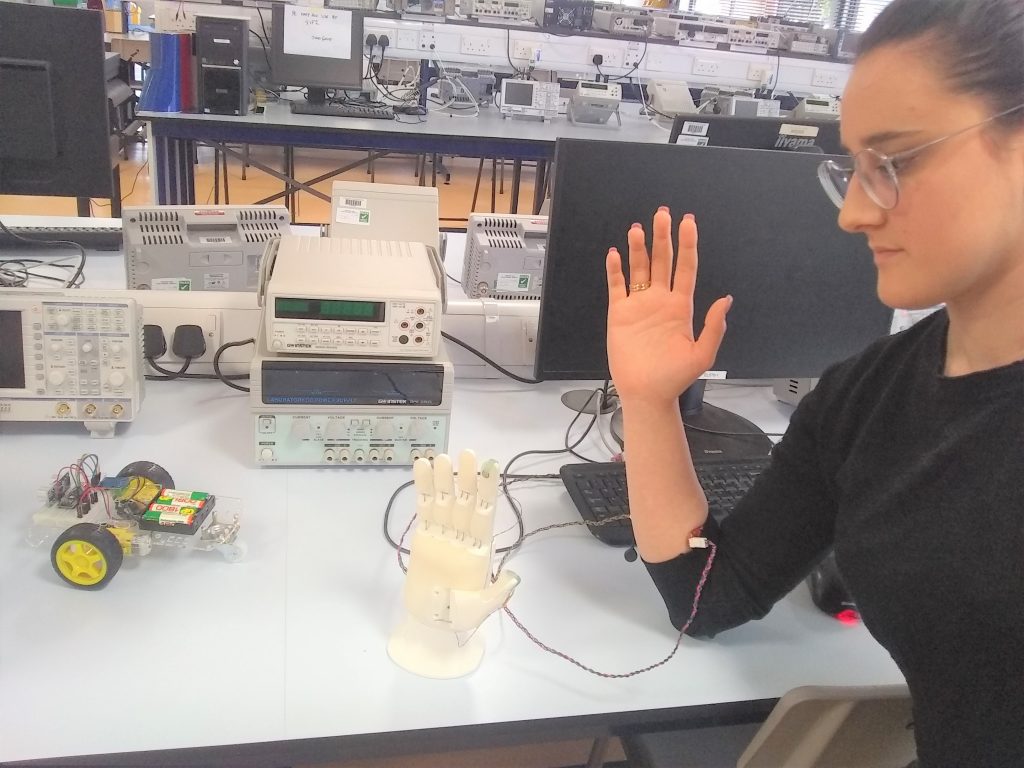To celebrate International Women in Engineering Day (23 June), researchers from the School of Engineering and Digital Arts (EDA), explain their career journeys in engineering, and why more women in engineering can make a difference to the industry.
Paula Delgado-Santos is a Marie Curie Early Stage Researcher and Dr Viktorija Makarovaite is a Lecturer in Biomedical Engineering, both within EDA.
Tell us about your career journeys in engineering to date…
Paula Delgado-Santos: ‘I started my PhD in 2020 with a Marie Curie Fellowship within the PriMa (Privacy Matters) EU project at Kent. Before joining Kent, I received a MSc degree in Telecommunications Engineering from Universidad Autonoma de Madrid, had a scholarship with IBM and worked as a Data Scientist at the School of Business and Engineering Vaud (Switzerland). My engineering expertise is in signal and image processing, pattern recognition, machine learning, biometrics and data protection.’
Dr Makarovaite: ‘I started out my educational career in medicine (BSc in biology and biochemistry). I had not even thought about engineering as a career option and biomedical engineering did not exist then as we know it today. However, I worked in IT whilst studying for my undergraduate degree, and I have always loved computers and videogames.
‘I continued with two master’s degrees in medical technology before I decided to combine my medical and technology background with a PhD in electronic engineering at University of Kent. Here I developed a passive Ultra High Frequency (UHF) Radio Frequency Identification (RFID) sensor for detection of fungal infections on voice prostheses.
‘At the same time, I became a team member of the East Kent Hospitals University NHS Foundation Trust (EKHUFT) multi-disciplinary team on voice prosthesis management. This led to the development of a clinical pathway for voice prosthesis management currently implemented by many NHS Foundation Trusts as well as many other countries throughout the world. This partnership has now evolved to include tracheotomy tubing care and the team is still continuing. I have been lecturing higher education students since 2012 and the biomedical engineering students at the University of Kent since 2017. I still love UHF RFID, so my research interests include RFID sensors for medical applications, wearable technology, and implementing ‘smart’ improvements to existing industry devices. I’m currently working on projects for industry applications.’
What challenges do women in engineering face?
Dr Makarovaite: ‘There is a lot of assumption in the engineering field that researchers are men. 91% of the time this would be right in electronic engineering, as it is still a male-dominated field, but we need more women in the field so that there is no longer this assumption. We can help break down the stereotype barrier.’
What can women bring to engineering that makes a difference?
Paula Delgado-Santos: ‘Women in engineering have different thoughts and look beyond doing what is necessary. We think a lot about things and thanks to that we can turn everything around and draw a lot of conclusions that can help progress.’
Dr Makarovaite: ‘Women are great at multitasking, have varied backgrounds and can bring new perspectives to the engineering field. Our backgrounds and life experiences can aid in improving the work culture or looking at things from a different perspective which is necessary to keep the field evolving.’
What advice would you offer women looking to pursue a career in engineering?
Paula Delgado-Santos: ‘Studying engineering is an opportunity that none of us should miss. Engineering is change, it is the future, that’s why we must be part of it. There must be women engineers in order to build a future together. No one but us can control our lives, our change and our future.’
Dr Makarovaite: ‘I just want women and young girls to realise that today they can pursue anything they want as long they have an interest in it. I’m not Einstein with maths myself but I always liked solving problems, learning new things and working with computers. Sometimes, depending on what field you choose, you might feel alone but you are not. It is something that I had to struggle with myself as I went from a field with many women (medicine) to electronic engineering where it was basically me, myself, and I. I had to really fight my imposter syndrome to prove to myself that I belonged here. So, I just want to say this loudly, we are a small minority growing every year and I hope you choose to join me.’



